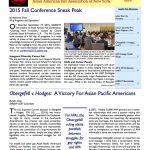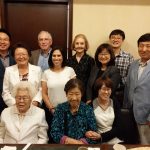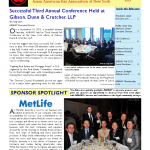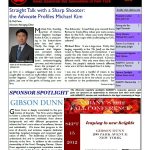By Theodore K. Cheng
Chair, Litigation ADR Subcommittee
Here is the story of how a tragedy in the art world was recently averted when grassroots activism, coupled with a successful mediation, avoided litigation and achieved an outcome satisfying to all concerned.
As reported in periodicals such as The Sacramento Bee and The New York Times,(1) it all began when Rago Arts and Auctions, a Lambertville, New Jersey auction house, announced an April 17, 2015 auction of about 450 Japanese internment camp items, including dozens of hand-carved wooden family name plates that were attached to barracks, various other crafts (such as cigarette cases woven from onion sack string), personal objects, ID cards and portraits, prisoner artworks, and numerous family photographs. This announcement prompted Japanese-Americans in Sacramento to launch a national campaign to persuade the seller to donate the items to a museum. The campaign included the Facebook page “Japanese American History: NOT for Sale,” which had garnered 6,200 followers and received almost 1,800 “likes” shortly before the auction date. Someone also started a petition on change.org, which called the sale “a betrayal of those imprisoned people who thought their gifts would be used to educate, not be sold to the highest bidder in a national auction, pitting families against museums against private collectors.” Social media posts called for the collection to be turned over to an educational institution, and internees and their descendants also wrote to say that they had recognized their own family members in the photos that were up for sale. For example, after the poet Janice Mirikitani saw an image of her cousin in a batch of photos that were expected to be sold for between $800 and $1,200, she posted the following on the Facebook page: “Do not commit this travesty of cheapening and ‘selling’ memories of cherished family members, and artwork which was created to survive the isolation and humiliation of the camp experience.”
Attorneys were not absent from this protest. The Board of Directors of the Asian/Pacific Bar Association of Sacramento (ABAS) voted unanimously to condemn the auction and wrote a letter to the auction house, expressing its “shock and disappointment” upon learning that these items were up for sale.(2) In the letter, the bar group further asked that the items “be withdrawn and that the Asian/Pacific Islander American community be given an opportunity to fully voice our concerns and work towards an avenue to preserve the incredible collection of items donated by those incarcerated during World War II and their families, so as to benefit history.” The ABAS letter even likened these artifacts to Holocaust property. Indeed, there were many protesters who recalled and/or equated this planned auction to the 2013 offer for sale of about 30 apparently Holocaust-related items on eBay, which included a striped prisoner uniform from Auschwitz, a pair of shoes, a prisoner’s suitcase, Star of David armbands, a concentration camp toothbrush, and other personal effects. In response to the worldwide outrage, eBay apologized, took down the items, and even donated $40,000 to charity.(3)
The auction house, however, initially refused to stop the scheduled sale, maintaining that the seller was “not in a position” to do so and was offended by the pressure being generated through social media. The collection in question had belonged to the late Allen H. Eaton, a former Oregon state legislator and anti-war activist, who became known as a champion of folk art both during and after World War II. In the aftermath of the bombing of Pearl Harbor, on February 19, 1942, President Franklin D. Roosevelt had issued Executive Order 9066, under which the Federal Government forcibly incarcerated some 120,000 people of Japanese ancestry who lived on the Pacific coast into ten “internment” camps—also referred to as “relocation” or “concentration” camps—scattered across the United States. Approximately 8,000 of the internees were from the Sacramento area and nearly two-thirds (about 77,000) were U.S. citizens. At the close of the war, Eaton visited five of these camps to study and collect the handicrafts made there, receiving many of the items in his collection as gifts from the internees he met. In 1952, he published a book about this experience entitled, “Beauty Behind Barbed Wire: The Arts of the Japanese in Our War Relocation Camps,” which included a foreword written by Eleanor Roosevelt. The book included 81 sets of photos of Japanese-American artisans and their works, and most of the items came from the Heart Mountain War Relocation Center in Wyoming, where approximately 14,000 people were imprisoned between August 1942 and November 1945.(4) Ironically, Eaton had written in the introduction to his book that he hoped that his writing would help right “a great wrong” done to Japanese-Americans. He had also hoped to curate an exhibition of his collection of artifacts to educate the public about the plight of Japanese-Americans during the war, but, unfortunately, that never came to pass. He died in 1962, bequeathing his collection to Thomas Ryan, a contractor who had worked for the Eaton family. Ryan subsequently bequeathed the collection to his son John, who cared for it for over 35 years and ultimately became the auction’s consignor.
In view of the foregoing, could the planned auction somehow be stopped through legal process? Did any of the internment camp survivors, or the descendants of those who had gifted the property to Eaton, have any legitimate claim of ownership (or some other right) to the artifacts in question such that they had a say in how they were disposed? Did ABAS or the Heart Mountain War Relocation Center have a cognizable legal basis or theory on which to challenge the planned auction? In short, there was an abundance of questions regarding who would be an appropriate party in interest here and what standing such a party had to bring, for example, an injunction application in the New Jersey courts to enjoin the auction. Based upon the collection’s apparent chain of custody, Ryan’s unfettered right to sell the items, and the immediacy of the auction, there appeared to be much uncertainty as to whether the auction could, in fact, be legally stopped in time. At bottom, the auction proceeding itself appeared to be a legal sale.
And then, two days before the auction, actor, director, author, and activist George Takei appeared on the scene. Yes, the same Takei who is perhaps best known for playing the character of Ensign Hikaru Sulu, helmsman of the U.S.S. Enterprise in the “Star Trek” television series and six feature films. In 1942, when he was only a child, Takei and his family were relocated to the Rohwer War Relocation Center in Arkansas and then later to the Tule Lake War Relocation Center in California. The time he had spent in these internment camps had made a lasting impression on him.(5)
With Takei’s involvement, Rago canceled the auction and negotiated a sale of the collection to the Japanese American National Museum in Los Angeles (www.janm.org), which the museum announced on May 2nd.(6) Takei, who serves on the board of the museum, was apparently “[i]nstrumental in convincing the auction house not to go forward with the sale.”(7) He “stepped in as an intermediary,”(8) successfully conducting a “mediation”(9) involving “a few calls … in the wee hours”(10) that resulted in the auction lots being pulled and sold to the museum. G.W. (Greg) Kimura, Ph.D., the President and CEO of the museum, was quoted as saying, “This collection wouldn’t be coming to JANM if it weren’t for the intervention and passion of George Takei. He stepped in to ask Rago that the auction be canceled, and, I mean, who can say no to George?”(11) As for the man himself, Takei had this to say:
Many of the photos picture peoples’ grandparents and parents, and there’s a strong emotional tie there. To put that up on the auction block to the highest bidder, where it would just disappear into someone’s collection, was insensitive. The most appropriate and obvious place for the collection was the Japanese American National Museum. I talked to David Rago [of Rago Arts and Auctions] after the uproar, and he was very thoughtful and receptive… . [The internment camps were] an egregious violation of the American Constitution. We were innocent American citizens and we were imprisoned simply because we happened to look like the people who bombed Pearl Harbor. It shows us just how fragile our Constitution is. Now these items can be shared with a large audience.(12)
And to its credit, the auction house issued a statement saying, “It’s truly fitting that this material will reside in perpetuity at an institution dedicated to sharing the Japanese-American experience and based on the West Coast, the site of the evacuation… . [This unanticipated controversy will] fuel a larger conversation about the marketplace for historical property associated with man’s inhumanity.”(13)
What is this “mediation” that Takei so successfully performed? Mediation is a confidential dispute resolution mechanism in which the parties to the dispute engage a neutral, disinterested third-party who facilitates discussion to assist them in arriving at a mutually consensual resolution. Because mediation is a non-adjudicative process, there is no judge or other decision maker who will determine the merits of the dispute. Rather, the mediator’s role is to try and improve communications between the parties, explore possible alternatives, and address the underlying interests and needs of the parties in hopes of moving them towards a negotiated settlement or other resolution of their own making. Although a mediator may be asked to recommend possible solutions, a mediator is not authorized to impose a resolution, but, rather, provides an impartial perspective on the dispute to help the parties satisfy their best interests while uncovering areas of mutual gain. Thus, mediation can be particularly helpful in those situations where the parties either are not effectively negotiating a resolution on their own or have arrived at an impasse in their dialogue. Mediation is also prospective, not retrospective, in nature. While a litigation looks to past events to find fault and impose appropriate relief, a mediation focuses on the future to determine how the parties can best resolve the pending dispute and move on. In that respect, a mediation tends to be more cooperative, rather than adversarial, in nature.(14)
There are a number of lessons to be learned from this brief episode. First, although a seemingly obvious first step, the court system is not always the best option when there is a great sense of urgency, and especially when there is uncertainty on fundamental gateway legal issues like identifying a real party in interest and establishing proper standing. Second, methods of alternative dispute resolution can be both fast and cost-effective. Here, with the auction looming in a matter of days, everything was resolved—including finding a home for these treasured artifacts—in about two weeks, using little more than the will and the desire to get it done. Finally, oftentimes, identifying the right neutral is key to finding a satisfactory resolution. It pays to invest the time and effort necessary to select the appropriate neutral for the particular situation. Each dispute presents a unique set of circumstances, and a neutral who is suited for one dispute—because of background, skill, experience, subject matter expertise, community ties, or any other applicable criterion—is not always necessarily the best choice for every other kind of dispute. Here, Takei’s involvement was not only the right and apt choice for a whole host of reasons, but also highly effective in achieving closure for all the parties. There is rarely a dispute where alternative dispute resolution methods do not have some role to play.
Theodore K. Cheng is a partner at the international law firm of Fox Horan & Camerini LLP where he practices in commercial litigation, intellectual property, and alternative dispute resolution (ADR). He is an arbitrator and mediator with the American Arbitration Association (AAA) and Resolute Systems, as well as on the neutral rosters of various federal and state courts. Mr. Cheng also serves on the AAA’s Board of Directors. More information is available at www.linkedin.com/in/theocheng. If you are interested in ADR, join the ADR Subcommittee of AABANY’s Litigation Committee by contacting the Chair, Theo Cheng, at tcheng@foxlex.com.
This article was published in the Fall 2015, Volume XVI, Issue IV of The AABANY Advocate, which can be read in its entirety here. To see all past versions of The AABANY Advocate, click here. To learn more about AABANY’s newsletter, you can email naf.kwun@aabany.org.
† An earlier version of this article was originally published in Volume 26, Number 2 of the Entertainment, Arts and Sports Law Journal, (Summer, 2015), a publication of the Entertainment, Arts and Sports Law Section of the New York State Bar Association.
- See, e.g., Eve M. Kahn, “Auction of Art Made by Japanese-Americans in Internment Camps Sparks Protest,” N.Y. Times (Apr. 13, 2015), available at artsbeat.blogs.nytimes.com/2015/04/13/auction-of-art-made-by-japanese-americans-in-internment-camps-sparks-protest/; Stephen Magagnini, “Sacramento Japanese Americans protest auction of internment camp art,” The Sacramento Bee (Apr. 13, 2015), available at www.sacbee.com/news/local/history/article18443588.html.
- Letter from Asian/Pacific Bar Association of Sacramento to David Rago (Apr. 14, 2015), available at www.abassacramento.com/wp-content/uploads/2015/04/ABAS-Letter-to-David-Rago-re-Auction-of-Internment-Camp-Artifacts.pdf.
- See, e.g., David Harding and Reuven Blau, “eBay apologizes for auction of Holocaust items that horrifies survivors,” New York Daily News (Nov. 3, 2013), available at www.nydailynews.com/news/world/ebay-apologizes-auctioning-holocaust-items-article-1.1505276; Mark Nicol and Simon Murphy, “Ebay’s sick trade in Holocaust souvenirs: Outrage over auctions of Death Camp relics,” DailyMail.com (Nov. 2, 2013), available at www.dailymail.co.uk/news/article-2485251/Ebays-sick-trade-Holocaust-souvenirs-Outrage-auctions-Death-Camp-relics.html.
- The Heart Mountain War Relocation Center is perhaps best known for the challenge by many of the younger, American-born Japanese males with U.S. citizenship (Nisei) to being drafted into the military from the camp in protest over the loss of their rights through the incarceration. This challenge led to the largest mass trial in Wyoming history, in which 63 Heart Mountain inmates were prosecuted and convicted for draft evasion. (AABANY, led by U.S. Circuit Judge Denny Chin and Kathy Hirata Chin, has performed a re-enactment of the draft resisters’ story based upon records of the court proceedings and other contemporaneous documents. This performance has since been repeated in many venues, including, most recently, at the New York Historical Society on May 16, 2015. See AABANY Blog (Apr. 24, 2015), available at blog.aabany.org/post/117271255917/new-york-historical-society-the-heart-mountain; N.Y. Historical Society, available at www.nyhistory.org/programs/heart-mountain-draft-resisters-trial-reenactment.) Notwithstanding this, approximately 800 Nisei joined the U.S. Army from this camp, either volunteering or accepting conscription into the famed and highly decorated 442nd Regimental Combat Team. See The Story of the 442nd Combat Team, available at content.cdlib.org/ark:/13030/hb2s2004jj/. The Heart Mountain Interpretive Center, a museum established in 2011 and dedicated to passing on the story of Heart Mountain to future generations through photographs, artifacts, oral histories, and interactive exhibits (www.heartmountain.org), also asked Rago to delay the auction or remove the artifacts from the sale so that Japanese cultural organizations could have the first chance to buy them.
- Later this year, Takei will be starring with Lea Salonga and Telly Leung in a new Broadway musical entitled “Allegiance,” which is inspired by his own true-life experience.
- Japanese American National Museum, “JANM Announces Acquisition of Japanese American Incarceration Artifacts,” Press Release (May 2, 2015), available at www.janm.org/press/release/381/.
- Deborah Vankin, “George Takei helps L.A. museum acquire internment camp artifacts,” Los Angeles Times (May 2, 2015), available at www.latimes.com/entertainment/arts/culture/la-et-cm-japanese-american-national-museum-george-takei-internment-camp-artifacts-20150501-story.html#page=1.
- Editorial Board, “George Takei steps in to put internment art in right place,” The Sacramento Bee (April 15, 2015), available at www.sacbee.com/opinion/editorials/article18627510.html.
- Anne Claire Stapleton and Steve Almasy, “After furor, auction house pulls items from Japanese-American WWII camps,” cnn.com (Apr. 16, 2015), available at www.cnn.com/2015/04/15/us/japanese-american-auction-uproar/index.html.
- Id.
- Vankin, supra, note 6.
- Id.
- Eve M. Kahn, “Japanese American Museum Acquires Internee Artifacts,” N.Y. Times (May 3, 2015), available at www.nytimes.com/2015/05/04/arts/japanese-american-museum-acquires-internee-artifacts.html.
- There are a number of organizations that provide more information on mediation as a dispute resolution mechanism. See, e.g., New York State Unified Courts System (www.nycourts.gov/ip/adr/What_Is_ADR.shtml); National Academy of Distinguished Neutrals (www.nadn.org/faq-adr.html); Mediate.com (www.mediate.com/about); International Mediation Institute (imimediation.org); American Arbitration Association’s Mediation.org (www.mediation.org); JAMS (www.jamsadr.com/adr-mediation).





